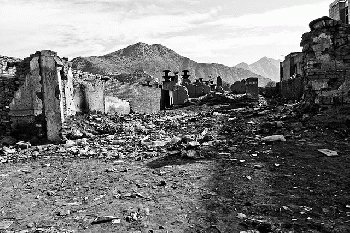From Smirking Chimp

Afghanistan rubble
(Image by (From Wikimedia) Gideon Tsang, Author: Gideon Tsang) Details Source DMCA
One of the most alarming developments in U.S. foreign policy in 2016 was the ratcheting up of the new iteration of the Cold War. Looking back at U.S. foreign policy in this last year of Barack Obama's presidential tenure, other weighty developments include the ongoing proxy war in Syria, the U.S.-supported Saudi-led bombing in Yemen, U.S. use of drones and manned bombers in Libya, U.S. bombing in Iraq and Afghanistan, unprecedented U.S. military aid to Israel, U.S. special operations in Kenya, Ethiopia, Djibouti and Yemen, U.S. saber-rattling against China in the South China Sea, and steps toward normalization of relations with Cuba.
The intensification of Cold War dynamics became particularly apparent in March, when the U.S. government announced it would significantly increase the number of troops stationed in Eastern Europe, a direct provocation of Russia. Reuters called the expanded positioning of NATO troops and military equipment in that region the "biggest military build-up on Russia's borders since the Cold War."
"With the U.S. openly talking [of] a war with Russia, the continued deployments seem far from a purely defensive measure," Jason Ditz wrote in Antiwar.com.
In spite of overwhelming American support for a "no first use" nuclear policy, President Barack Obama refused to promise the United States would not again be the first nation to deploy nuclear weapons. Gen. James Cartwright, former vice chairman of the Joint Chiefs of Staff and leader of the U.S. Strategic Command, warned in an August New York Times column that "using nuclear weapons first against Russia and China would endanger our and our allies' very survival by encouraging full-scale retaliation."
In October, the United States and other major nuclear powers voted against a UN General Assembly resolution calling for a treaty that would outlaw nuclear weapons.
The CIA report of Russian involvement in email hacking during the U.S. presidential election has fanned the flames of anti-Russia sentiment in the United States. But, as Ivan Krastev wrote in the New York Times, private citizens, not just governments, hack email accounts. "The Cold War narrative ignores this new reality because it tends to see any subversive activity as the work of states," according to Krastev.
Meanwhile, Obama has continued to prosecute his drone wars in seven countries. After three years of resisting transparency on numbers of civilian casualties in his targeted killing program, the Director of National Intelligence (DNI) finally released figures far lower than those documented by the leading NGOs such as the Bureau of Investigative Journalism.
And three and half years after Obama promised to make the rules for the U.S. targeted killing program more transparent, he finally released the Presidential Policy Guidance, although much of it is redacted, or blacked out. The release was judicially compelled in response to a Freedom of Information Act request by the American Civil Liberties Union (ACLU).
U.S. military operations abroad were the primary motivation for "homegrown terrorism," according to a secret FBI study.
Here is a rundown of U.S. foreign policy in 2016:
Syria
The tragic war in Syria continues unabated, with the Syrian government fighting ISIS (also known as Daesh) and defending itself against rebel forces. Although Assad has been responsible for large numbers of civilian casualties, New York University and Princeton Professor Emeritus Stephen Cohen told Democracy Now! that the "fog of war" makes it difficult to sort out whether the liberation of Aleppo is "a good thing" or whether Russia and Syria are committing war crimes, which is "a bad thing." Cohen added, "the charge that Russia deliberately targets civilian facilities and centers is, of course, a part of the growing anti-Russian line that's captured our politics and has led to this scandal in Washington."
Paul Pillar wrote on Consortium News that "brutality and infliction of wholesale suffering on civilians have not been limited to any one side," as there are multiple parties fighting in Aleppo. Pillar noted "the war against Assad is all about regime change."
Regime change in Syria has been U.S. policy, and to that end, the U.S. military has armed and assisted the "Free Syrian Army" and other rebels to destabilize the Bashar al-Assad regime. The US-supported armed opposition joined with the al-Nusra Front, an Al Qaeda affiliate, and its jihadist allies to destroy the ceasefire in August, Gareth Porter wrote for FAIR. Forcible regime change violates the United Nations Charter and the International Covenant on Civil and Political Rights.
(Note: You can view every article as one long page if you sign up as an Advocate Member, or higher).





